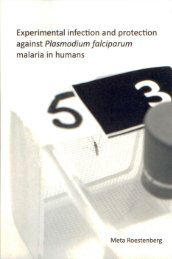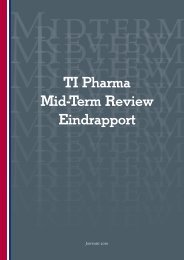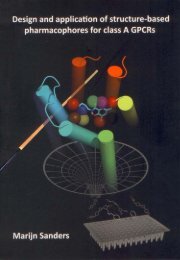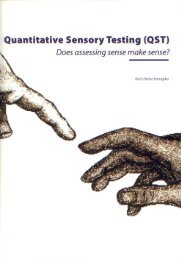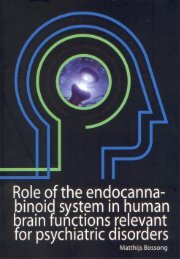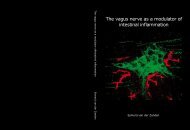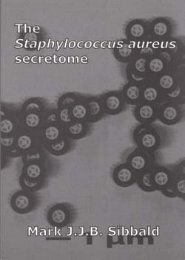Chromosome segregation errors: a double-edged sword - TI Pharma
Chromosome segregation errors: a double-edged sword - TI Pharma
Chromosome segregation errors: a double-edged sword - TI Pharma
Create successful ePaper yourself
Turn your PDF publications into a flip-book with our unique Google optimized e-Paper software.
4<br />
Two other interesting mitotic targets, for which inhibitors are currently under investigation, are the<br />
kinases Aurora A and Polo-like kinase-1 (Plk-1) 184 . Both are overexpressed in cancer 477,478 and both<br />
have important roles in G2 and mitosis 479,480 . Inhibition of either Aurora A or Plk1 results in monopolar<br />
spindle formation, due to their roles in centrosome maturation and separation in G2 479,480 . As such,<br />
the most profound effects after inhibition of Plk1 or Aurora A are perturbation of mitotic progression,<br />
making both of these kinases attractive and possibly specific anti-mitotic targets. Many inhibitors have<br />
been produced that target these kinases, and several have already entered clinical trials 477,478 (Table I).<br />
The kinesin motor protein CENP-E is the most recent addition to potential anti-mitotic targets. It is a kinetochoreassociated<br />
kinesin, whose function appears to be restricted to mitosis. Upon absence or inhibition of its activity,<br />
cells are delayed in mitosis for a prolonged period of time with unaligned chromosomes 481 . Inhibition of CENP-E<br />
function has been shown to elicit anti-tumor effects in mouse models of spontaneous tumor formation 397 as well<br />
as in mice bearing xenografts of human tumor cells 482 . Moreover, inhibitors of CENP-E are currently being tested<br />
in phase I clinical trials 471,483 (Table I).<br />
1.3 Why does a mitotic delay result in cell death?<br />
Cells treated with classical anti-mitotic drugs will delay mitotic progression for an extensive period of<br />
time due to the action of the mitotic checkpoint. This prolonged mitotic delay is often followed by cell<br />
death in mitosis (mitotic cell death). However, a subset of cells can escape mitotic cell death and exit<br />
342 . Remarkably, there is a great variation in the timing of cell death amongst cells within a genetically<br />
identical population. Thus, as a consequence of a mitotic checkpoint-dependent delay, cells either die<br />
in mitosis or they exit mitosis in a tetraploid state despite an active mitotic checkpoint, a process called<br />
mitotic checkpoint slippage 342,484,485 (Fig.1). In several independent studies, no clear correlation was<br />
found between the duration of the mitotic delay and cell fate, indicating that the time a cell arrests in<br />
mitosis does not dictate whether a cell will die in mitosis, slip from the mitotic arrest and die in the next<br />
G1 phase or slip out and continue to proliferate 342,486,487 . However, it has become clear that during the<br />
mitotic arrest, cyclin B levels slowly drop despite an active mitotic checkpoint (Brito et al., 2006). This<br />
has led to a model for drug-induced mitotic death in which two independent processes are active during<br />
the arrest 342 . In this model a slow but progressive loss of cyclin B is paralleled by a slow but steady rise<br />
in caspase activity. This predicts that once cyclin B levels have dropped below a certain threshold before<br />
caspase activation has reached its critical threshold to induce apoptosis, cells will exit mitosis without<br />
undergoing cell death in mitosis. However, when cyclin B levels have not dropped sufficiently low to<br />
exit mitosis and caspase activation has already reached its death threshold, cells will die in mitosis 342 .<br />
This model, however, does not provide an answer to the question how a prolonged delay in mitosis<br />
could result in caspase activation. Mitosis is a phase in which several high energy consuming processes<br />
are active, such as chromosome condensation, mitotic spindle formation, chromosome congression<br />
and <strong>segregation</strong>, while several other cellular processes, such as vesicle transport and transcription<br />
are inhibited. A prolonged mitosis could therefore easily result in energy deprivation. Moreover, the<br />
cell is extremely vulnerable during mitosis. The chromosomes are in a highly condensed state and not<br />
protected by the nuclear membrane. In fact, it has been shown that mitotic cells have an enhanced<br />
sensitivity to for example radiation treatment, 488,489 . Therefore, cells could have evolved an intrinsic proapoptotic<br />
pathway that is responsible for clearance of cells that spend too much time in mitosis. Indeed,<br />
recent data show that a mitotic delay of only two hours can already result in p53 activation, indicating<br />
that a prolonged duration of the mitotic phase can directly activate a stress response in mitotic cells 490 .<br />
Interestingly, Cyclin B-cdk1 is thought to have a central role in controlling both mitotic duration and<br />
the apoptotic machinery. It can phosphorylate and inhibit caspase 9 during mitosis 491 . This suggests<br />
that, during a prolonged mitosis, a slow but steady drop in Cyclin B levels could be paralleled by a<br />
76




